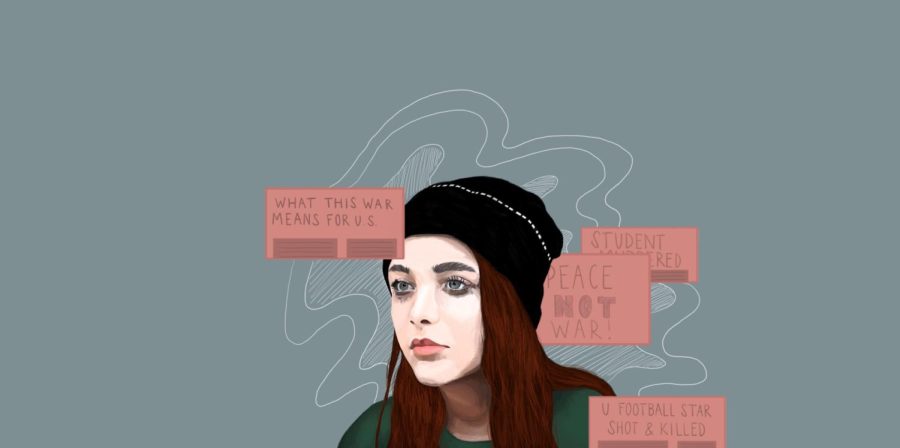Cushman: Campus Losses Fuel Our Headline Anxiety
(Design by Storey McDonald | The Daily Utah Chronicle)
May 6, 2022
Headline anxiety is when sad or stressful stories in the news take a toll on an individual’s mental health. With the rise of the 24/7 news cycle and constant social media notifications, many people feel overwhelmed by news. Since moving to college and becoming more engaged with my community, the news has greatly impacted my life and mental health. However, the 2021-22 school year has felt especially difficult.
The University of Utah’s campus community experienced multiple student deaths, causing us to grieve for our peers over and over. The news can feel overwhelming on its own, but these losses add to feelings of helplessness and anxiety. With the losses we’ve experienced as a community over the past year, it’s important to recognize when and why we need to take breaks.
Over the last year, our global community saw headlines about climate change, the ongoing pandemic and war in Ukraine. These major events can make us feel helpless. I’ve seen a friend cry about climate change and the impossibility of fixing it with any individual action. I’ve cried after reading articles about civilian deaths in Ukraine.
These global events don’t minimize the impact that local and campus issues have had on us. As U students, we’ve read about the deaths of students we’ve had classes with or cheered on in our stadium. In October 2021, Aaron Lowe was fatally shot at a party in Sugarhouse, marking the fifth killing of a U student in only five years. This February, Zhifan Dong was murdered at a Salt Lake City motel, adding to that number.
The death of any member of our campus community is deeply tragic. These impact us more because they result from the bigger problems we see in the news, such as domestic and gun violence. The headline anxiety we feel over issues like gun and dating violence manifests in the community where we live and go to school.
In 2020, Ty Jordan was killed in an accidental self-inflicted shooting. Seeing Lowe, who wore Jordan’s jersey number, killed by gun violence less than a year after Jordan is devastating. In 2018, the death of Lauren McCluskey at the hands of a former romantic partner unnerved our campus community. The death of Dong reminds us of the ongoing prevalence of domestic violence on our campus and the continued need for better resources. It’s difficult to see our peers die despite our demands for more student safety resources.
Headline anxiety uniquely affects our campus because of our shared losses in recent years. However, along with advocating for resources and safety, we need to feel comfortable with taking a break from the news. Mental health professionals have recommended limiting news and notifications to a few reliable sources, waiting to read breaking news and avoiding triggering topics.
Speaking from experience, these habits help preserve my emotional energy. I work around the football team and have seen the effects of these tragedies on those close to the victims. I wish I had thought to turn off my Twitter notifications when Lowe died. The grief I saw along with the constant notifications about Lowe’s death compounded my own feelings of loss. I wish I had learned to avoid triggering topics in the news earlier because I don’t often get to choose when I see campus safety notifications about topics like sexual violence.
Given the relevance of student deaths to our campus, taking a break from the news can feel irresponsible or morally wrong. It also feels impossible to take a step back when we’re grieving with our classmates. However, we need to recognize that we can’t continue to advocate for student safety and movement on issues such as dating and gun violence if we don’t prioritize our own mental health.
Headline anxiety causes general feelings of stress, but it also contributes to more long-term stress, burnout and anxiety. The shared losses our campus has experienced have contributed to my own feelings of stress from the news in the last year. We all want to ensure the safety of ourselves and our peers, but we need to address our feelings of burnout to be good advocates.









